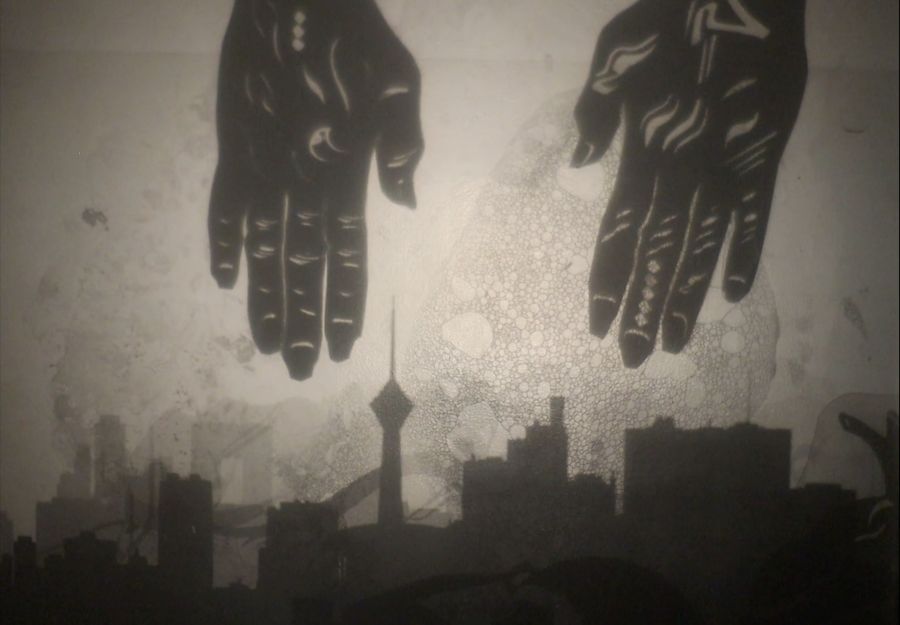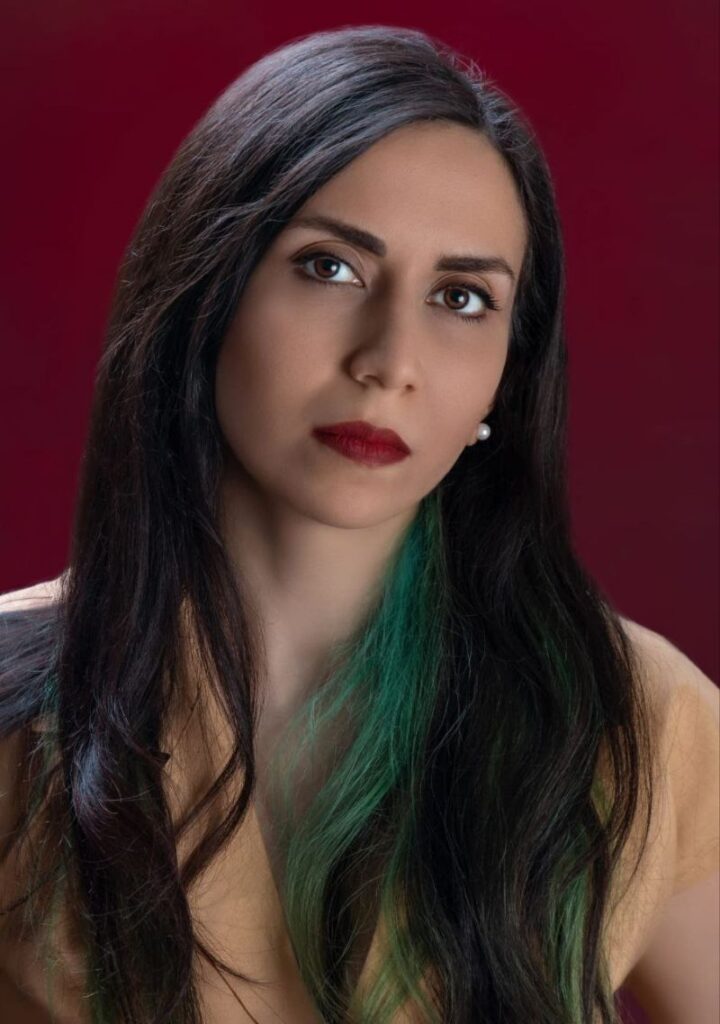Photo from work-in-progress showing of “Husks from Iran” at the Performance Project artist residency at the University Settlement-New York. (Photo by Deniz Khateri)
The following is from Migration Is Not a Metaphor, a series of works and excerpts by immigrant theatremakers that originally appeared in our Summer 2025 issue. To open the original print version in a new full-screen tab, click here.
Deniz (the writer/director) is onstage and asks the actors to take turns playing her throughout the piece. She gives them notes in real time, creating a live commentary on identity stereotypes and how the cast perceives her.
DENIZ (NARRATOR)
Everybody is fleeing. Protestors are being shot. The economy is collapsing. Theatre artists are on strike. They don’t want to accept the mandatory hijab for their actresses onstage anymore—and that means they can’t stage anything. Hope and motivation are lost. People are looking for a window to jump out of. I want to do something. I want to engage my theatre friends and motivate them to keep working.
I came up with an idea: shadow puppets. I’d ask artists in Iran to design them, then showcase their work in New York. It would be a way for them to feel like their work still matters, that it’s seen—without having to surrender to the government’s rules.
I reach out to my friend Vahid, an actor and stage director in Tehran, to find young puppet designers who are currently on strike. (She holds her phone up as if recording a voice message.)
سلام وحید جان چطوری؟ ببین من برای همون اجرای شعرهام دنبال طراح عروسکم. کسی رو میشناسی معرفی کنی؟ ترجیحا کسانی که بیکار شدن و براشون موقعیت و انگیزهی خوبیه واسه کار کردن.
Three weeks pass. I still haven’t heard from them. I go to find them on my own. (Crosses stage right to Tehran. A poem plays through the speakers as shadow puppets appear.)
تفگ خساپ دنهاوخ یمن ار تمالس
تسا نابیرگ رد اهرس.
رادید و نتفگ خساپ درآ یمن رب رس یسک ار نارای…
They don’t want to answer your greeting.
Their heads are in their collars.
No one raises their head to respond or to see friends.
دناوتن دید ار اپ شیپ زج هگن
تسا نازغل و کیرات هر هک…
You can’t see anything beyond your feet—
the path is dark and slippery.
یزای سک یوس تبحم تسد رگو،
نوریب لغب زا تسد دروآ هارکا هب،
تسا نازوس تخس امرس هک…
And if you reach out a hand in love,
they pull theirs from their pocket reluctantly—
the cold is burning hard.
یآ …تسا درس هنادرمناوجان سب اوه!
یاشگب رد ،یوگ خساپ وت ار تمالس!
The weather is brutally cold… Oh!
You—answer my greeting, open the door!
…نابیرگ رد اهرس ،هتسب اهرد ،ریگلد اوه
It’s winter.*
(She is back in the U.S., stage left, reading a Farsi book as the poem continues.)
DENIZ (NARRATOR)
I didn’t expect that. Usually, people are excited to work internationally. But this time—nothing. Some showed interest, but then said they couldn’t focus. “What does it matter anyway?” they asked.
It made me question my own motivation.
What does my work matter? What am I doing?
(Actor 1, Actor 3, and Actor 4 enter.)
DENIZ
(to Actor 1) You play me.
(Actor 1 takes on the role of Deniz. Actors 3 and 4 surround her.)
ACTOR 3
This is a ridiculous idea. How are you going to engage artists in Tehran? Long-distance rehearsals never work.
DENIZ (ACTOR 1)
They’re just designing puppets. We can meet online.
ACTOR 4
How are you paying them? You can’t legally send money to Iran.
DENIZ (ACTOR 1)
I’ll pay them in cash when I visit.
ACTOR 4
And they never arrest you for going back?
ACTOR 3
And you’re going to tell the funders you carried money from the U.S. to Iran? Really?
DENIZ (ACTOR 1)
I’ll pay out of pocket.
ACTOR 4
Doesn’t matter. Once you credit them, you have to include them in your budget report.
ACTOR 3
Are you sure you don’t have family ties to the Iranian government?
ACTOR 4
Just hire some exiled Iranian artists. That would be easier.
DENIZ (ACTOR 1)
But then how do I help the ones still inside? I wanted to give them some hope.
ACTOR 4
Well, apparently they don’t need you for motivation.
ACTOR 3
You’re just creating trouble for yourself.
DENIZ (ACTOR 1)
Goh nakhor baba! (“Go f*** yourself!” in Farsi)
(Actors 3 and 4 laugh. They all break character.)
DENIZ (NARRATOR)
Where did you learn that?
ACTOR 1
Oh, you say it a lot when you speak Farsi.
ACTOR 3
That was so good—I almost peed myself! Can we take a break?
ACTOR 4
It’s time. Everyone take ten!
ALL ACTORS
Thank you, ten!
(Deniz is stunned. Actors exit, still laughing. Silence. She picks up a book by Adorno.)
DENIZ (NARRATOR)
I pause my creative process. I’m on strike. I read more. Maybe I’ll find myself in philosophy. Philosophy’s supposed to open up possibilities.
Maybe I shouldn’t care about those artists and their motivations. Maybe they’ll find their way. Maybe I should stop thinking about going back.
Maybe I’m finally an immigrant now. Maybe I need to stop going back and forth so much.
Maybe Adorno can help me! He didn’t want to leave Germany forever either. When he came to the U.S., it took years for him to feel like he could fully exist in American culture while still keeping his German identity. Even as a white German intellectual, Adorno was under FBI surveillance. That surprised me.
Even he felt isolated, uncertain, and afraid of being deported.
Just like the rest of us.
(END OF EXCERPT)
*Poem by Mehdi Akhavan Sales (1928-1990)



Deniz Khateri is a multidisciplinary artist from Tehran, based in New York. Her work spans theatre, experimental music-theatre, and contemporary opera, often exploring themes of memory, grief, immigration, and home. Her plays and performances have been produced nationally and her essays on theatre and puppetry have been published by the Brill through Edward Albee’s association and Puppetry International Journal. She is a resident artist for LaMaMa’s 64th season and has held residencies at the Performance Project at University Settlement and the Center at West Park. She is also a member of New Perspectives Theatre’s playwriting lab and a recipient of several awards, including The Jim Henson grant and UNIMA-USA recognition for excellence in puppetry writing. As an actor and member of Actors’ Equity Association, she has performed extensively in Tehran, Boston, and New York. She holds an MA in Theatre from CUNY and teaches at Hunter College. An excerpt of her current project Husks from Iran will be performed at LaMaMa’s JumpStart festival November 2025 in New York.